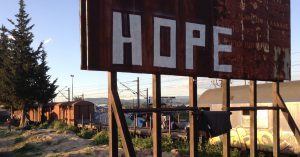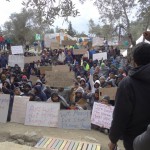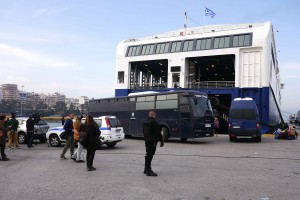A refugee-housing squat as an example of how to fight social struggles together on a daily level and for another tomorrow
 „The City Plaza squat at 78 Acharnon celebrates its first month. The hotel now houses refugee families totalling 385 people, including 180 children. These include 22 single parent families, as well as people with disabilities. The nationalities that make up City Plaza include Afghans, Kurds, Syrians, Palestinians, Iranians, Iraqis and Pakistanis. The families being housed at City Plaza were selected on the basis of their previous “housing” arrangement as well as on the particular problems being faced by each one. Each family lives in a separate room of the hotel, while all inhabitants are provided with breakfast, lunch and dinner, as well as with hygiene products and other essentials. Nearly all are covered through solidarity offerings, while the few purchases that need to be made are financed through donations sourced from within Greece and from abroad.
„The City Plaza squat at 78 Acharnon celebrates its first month. The hotel now houses refugee families totalling 385 people, including 180 children. These include 22 single parent families, as well as people with disabilities. The nationalities that make up City Plaza include Afghans, Kurds, Syrians, Palestinians, Iranians, Iraqis and Pakistanis. The families being housed at City Plaza were selected on the basis of their previous “housing” arrangement as well as on the particular problems being faced by each one. Each family lives in a separate room of the hotel, while all inhabitants are provided with breakfast, lunch and dinner, as well as with hygiene products and other essentials. Nearly all are covered through solidarity offerings, while the few purchases that need to be made are financed through donations sourced from within Greece and from abroad.
In a framework of self-organization and coexistence, there are teams for cleaning, cooking, security, education and childcare, medical care, communications, reception, as well as regular assemblies of refugees and solidarians. Initiatives such as that of City Plaza, apart from granting obvious rights and needs, also put in practice a conception of everyday life which aims to, through self organization and “bottom up” emancipation, ultimately form a space of freedom and creativity, which will act as living proof of the society which we envision.“ This is how the call for an Open Assembly in the City Plaza Hotel in Athens starts. The whole text can be found on their Blog.
 Among the first residents of the squat are many highly vulnerable people and refugees who have been supporting them in solidarity already before, when they were still neighbours in one of the overcrowded and sub-standard mass camps of the government. More than that, those that already helped others to self-organise, who accompanied them to hospitals and to NGOs, who voluntarily translated, they also suggested persons to move in who were in great need. So there is a lot of experience in self-organising under extremely difficult conditions already existent among the inhabitants which meets in one space with the solidarity of others from Greece and all over the world. During our first visit to the ‘Plaza’ we spoke with many of
Among the first residents of the squat are many highly vulnerable people and refugees who have been supporting them in solidarity already before, when they were still neighbours in one of the overcrowded and sub-standard mass camps of the government. More than that, those that already helped others to self-organise, who accompanied them to hospitals and to NGOs, who voluntarily translated, they also suggested persons to move in who were in great need. So there is a lot of experience in self-organising under extremely difficult conditions already existent among the inhabitants which meets in one space with the solidarity of others from Greece and all over the world. During our first visit to the ‘Plaza’ we spoke with many of the refugees who found a temporary home there. It is them who described to us their impressions and experiences of the first three weeks and what is most important for them about this space.
the refugees who found a temporary home there. It is them who described to us their impressions and experiences of the first three weeks and what is most important for them about this space.
Continue reading ‘City Plaza Hotel Athens (Greece)’
 Photos by Marios Lolos
Photos by Marios Lolos









